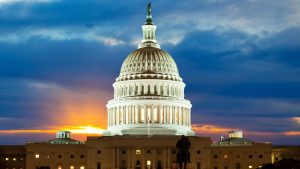Multiple Veterans Bills Unanimously Pass the House
By PVA National Staff
On September 22-23, the House of Representatives unanimously passed multiple bills brought to the floor by the House Committee on Veterans’ Affairs, many of which PVA supported.
Some of the bills passed are:
- R. 4908 – Native American PACT Act, which upholds U.S. treaty obligations to native people who served in the military by prohibiting VA from collecting copayments;
- R. 6589 – Department of Veterans Affairs Chief Financial Officer Authority and Collaboration Act of 2020, which would hold VA leadership accountable for risk and bad financial decisions in VA’s financial system;
- R. 3228 –VA Mission Telehealth Clarification Act, which corrects an error in the VA MISSION Act and allows VA trainees to use the telemedicine system while under supervision;
- R. 6092 –Veteran’s Prostate Cancer Treatment and Research Act, which creates a standardized clinical pathway for prostate cancer detection and treatment for veterans at VA;
- R. 7795 –Veterans Benefits Fairness and Transparency Act of 2020, which requires VA to maintain availability of disability benefits questionnaires (DBQs) on VA’s website;
- R. 8247 – Veterans Compact Act of 2020, which is a package of bills aimed to improving mental health benefits for veterans;
- R. 5245 – SHIELD for Veterans Act, which reforms VA’s debt collection process;
- R. 7105 – the Dependable Employment and Living Improvements for Veterans’ Economic Recovery (DELIVER) Act, which includes six provisions to support veterans during the COVID-19 pandemic through the provision of food, shelter, and access to VA telehealth services; and
- R. 3798 – Equal Access to Contraception for Veterans Act, which provides no cost contraception care for women veterans.
Also, of note is the House passage of S. 785, the Commander John Scott Hannon Veterans Mental Health Care Improvement Act of 2019, a $277 million veteran suicide prevention legislative package which is now on its way to the President’s desk for signature.
This comprehensive legislation includes provisions such as providing healthcare to all veterans for the year following their transition from the military, authorizing a grant program for organizations to provide suicide prevention services to veterans and their family members, reducing the shortage of VA mental health staff, and multiple studies and pilots aimed at specific populations of veterans.
Both Senate and House Veterans’ Affairs Committee Chairmen Jerry Moran and Mark Takano have promised that the passage of S. 785 does not mean the work on mental health is done.
Chairman Moran has committed to considering House passed legislation focused on suicide prevention.
They have also both promised to continue to work to bring legislation aimed at improving mental health care and resources for veterans in the 117th session of Congress.



